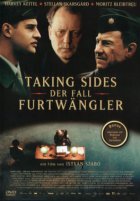
Taking Sides Page #14
- NOT RATED
- Year:
- 2001
- 108 min
- 526 Views
Mostly elderly, but some younger ones see Rode saluting.
Some turn away. Others stare.
STEVE'S VOICE
Rode and Steve:
Rode looks around nervously, lowers his arm.
STEVE:
And I see what you mean. You nearly
poked my eyes out.
RODE:
Exactly. Replaces the baton, gives
Steve the case.
STEVE:
Don't worry, Helmuth, it'll be our
secret.
A ball comes bounding towards them. Steve catches it. Then
BOY:
Mister, mister, here, here,
mister!!!
Steve tosses the ball back to him.
STEVE:
Great catch, kid. The boy runs
off.
RODE:
So. You wanted to see me.
Steve pats the spot next to him and Rode sits.
RODE:
You usually don't work on Sunday,
Major?
STEVE:
All in the cause of humanity,
Helmuth. Or should I call you one-
zero-four-nine-three-three-one?
RODE:
What?
STEVE:
One-zero-four-nine-three-three-
one. Or d'you mind if I just call
you 'one'?
Rode makes an attempt to go but Steve grabs him.
STEVE:
You know what I say you are,
Helmuth? I say you're a piece of
sh*t.
Rode suddenly starts to retch.
RODE:
That bastard!
People by the lakeside:
Faces turning at Rode's sobs. Impassive. Blank.
Steve and Rode:
STEVE:
Who's the bastard, Helmuth? Hinkel?
Rode nods.
STEVE:
Why? He promised to remove your
file?
Rode vomits.
STEVE:
And what about before that? What
were you a member of in Austria?
After a moment:
STEVE:
RODE:
(barely audible)
I was a member of the Communist
Party. I was a communist. That's
what Hinkel had over me. He knew
everything. He held that over me.
That's how he made me co-operate.
STEVE:
Oh, I see, he made you co-operate.
And now are you a communist again?
RODE:
(angry)
You don't know what it's like to
wake up every single morning of
your life terrified, you don't
know that -
(he stops.)
Brief silence. Steve stands.
Further along the lakeside:
Steve and Rode walk. People about. Boats on the lake.
RODE:
I would never, in my wildest dreams,
have ever been a second violinist
in the Berlin Philharmonic. When
they got rid of the... the Jews in
the orchestra, it gave people like
me a chance.
EXT. LAKE - DAY
Rode rowing Steve in a small boat. Rode, exhausted, stops.
The boat drifts. Steve watches him for a moment, then:
STEVE:
Helmuth, you ever heard of plea-
bargaining?
Rode, trying to catch his breath, shakes his head.
STEVE:
Talk about power, I have the power
to give you work, make your life
easier. Your past won't be
mentioned. I could give you a job
tomorrow but I have to get something
in return. See, Helmuth? That's
plea-bargaining.
No response. Rode keeps his head bowed.
STEVE:
I can give you freedom of movement,
freedom to work, freedom, Helmuth.
But I need something in return.
RODE:
Major, we're discussing a man of
genius, I don't want...
STEVE:
F*** that, Helmuth. You want to
discuss symbols here? This guy
was a front man. He was the piper,
but he played their tune, you get
my philosophical meaning? I'm not
interested in small fish, I'm after
Moby Dick. Come on, Helmuth. Hard
facts.
Silence. Then Rode slowly raises his head.
RODE:
The only thing I know is he's an
anti-Semite.
STEVE:
Of course. You, too. Like everyone
else in this goddamn country.
EXT. WOOD, LAKESIDE - DAY
Rode and Steve walking. Rode suddenly turns to him:
RODE:
I've remembered something else...
STEVE:
Yeah?
RODE:
Furtwängler sent Hitler a telegram
for his birthday.
Translation
Translate and read this script in other languages:
Select another language:
- - Select -
- 简体中文 (Chinese - Simplified)
- 繁體中文 (Chinese - Traditional)
- Español (Spanish)
- Esperanto (Esperanto)
- 日本語 (Japanese)
- Português (Portuguese)
- Deutsch (German)
- العربية (Arabic)
- Français (French)
- Русский (Russian)
- ಕನ್ನಡ (Kannada)
- 한국어 (Korean)
- עברית (Hebrew)
- Gaeilge (Irish)
- Українська (Ukrainian)
- اردو (Urdu)
- Magyar (Hungarian)
- मानक हिन्दी (Hindi)
- Indonesia (Indonesian)
- Italiano (Italian)
- தமிழ் (Tamil)
- Türkçe (Turkish)
- తెలుగు (Telugu)
- ภาษาไทย (Thai)
- Tiếng Việt (Vietnamese)
- Čeština (Czech)
- Polski (Polish)
- Bahasa Indonesia (Indonesian)
- Românește (Romanian)
- Nederlands (Dutch)
- Ελληνικά (Greek)
- Latinum (Latin)
- Svenska (Swedish)
- Dansk (Danish)
- Suomi (Finnish)
- فارسی (Persian)
- ייִדיש (Yiddish)
- հայերեն (Armenian)
- Norsk (Norwegian)
- English (English)
Citation
Use the citation below to add this screenplay to your bibliography:
Style:MLAChicagoAPA
"Taking Sides" Scripts.com. STANDS4 LLC, 2024. Web. 25 Dec. 2024. <https://www.scripts.com/script/taking_sides_403>.



Discuss this script with the community:
Report Comment
We're doing our best to make sure our content is useful, accurate and safe.
If by any chance you spot an inappropriate comment while navigating through our website please use this form to let us know, and we'll take care of it shortly.
Attachment
You need to be logged in to favorite.
Log In